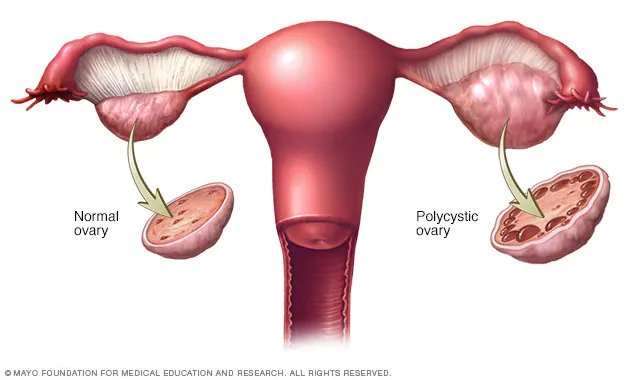
PCOS ( Polycystic Ovary Syndrome )
Polycystic Ovary Syndrome (PCOS) is a common endocrine disorder that affects individuals with ovaries, often during their reproductive years. It is characterized by a range of symptoms resulting from hormonal imbalances, insulin resistance, and ovarian dysfunction. PCOS can have implications for reproductive health, metabolic health, and overall well-being. Here are key aspects of PCOS:
Hormonal Imbalance:
PCOS is marked by elevated levels of androgens, the male hormones, which can disrupt the normal hormonal balance in the female body. This imbalance can affect the menstrual cycle, ovulation, and the development of ovarian cysts.
Menstrual Irregularities:
Irregular menstrual cycles are a common feature of PCOS.
Ovulatory Dysfunction:
PCOS often leads to anovulation, meaning that ovulation may not occur regularly or may not occur at all. This can contribute to fertility issues and difficulty conceiving.
Ovarian Cysts:
Despite the name, the cysts associated with PCOS are small, fluid-filled sacs on the ovaries. These cysts are a result of eggs not maturing or being released during ovulation.
Metabolic Effects:
Insulin resistance is common in individuals with PCOS, leading to elevated insulin levels. This can contribute to weight gain, difficulty in losing weight, and an increased risk of developing type 2 diabetes.
Hyperandrogenism:
Elevated androgen levels can lead to symptoms of hyperandrogenism, including hirsutism (excessive hair growth, particularly in male-pattern areas), acne, and male-pattern baldness.
Fertility Challenges:
Fertility treatments, such as ovulation-inducing medications or assisted reproductive technologies, may be recommended for those seeking to conceive.
Weight Management:
Maintaining a healthy weight through lifestyle modifications, including regular exercise and a balanced diet, is often a key component of managing PCOS. Weight loss can help improve insulin sensitivity and regulate menstrual cycles.
Hormonal Therapy:
Hormonal contraceptives, such as birth control pills, may be prescribed to regulate menstrual cycles, manage androgen-related symptoms, and reduce the risk of endometrial hyperplasia.
Long-term Health Considerations:
PCOS is associated with long-term health risks, including an increased likelihood of developing cardiovascular disease, type 2 diabetes, and endometrial cancer. Regular health monitoring and preventive measures are important for managing these risks.
While there is no cure for PCOS, early diagnosis and management can help alleviate symptoms and reduce the risk of complications. A multidisciplinary approach involving gynecologists, endocrinologists, and lifestyle interventions can provide comprehensive care tailored to the individual needs of those with PCOS.

